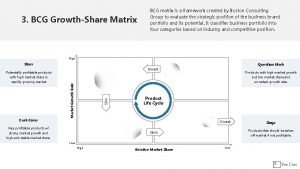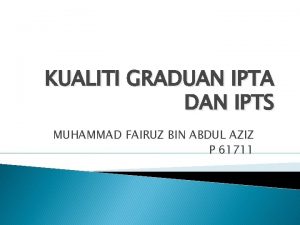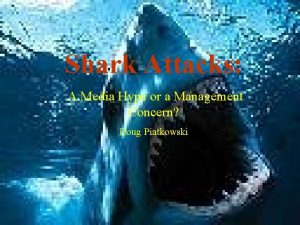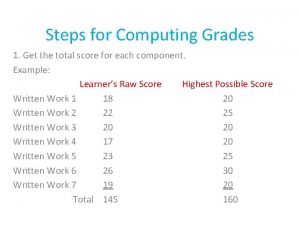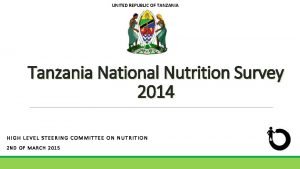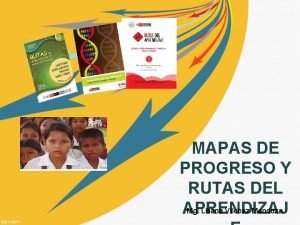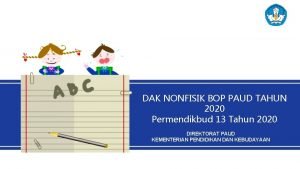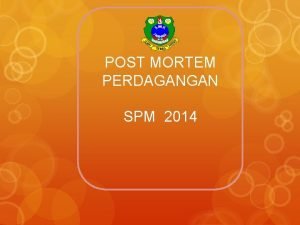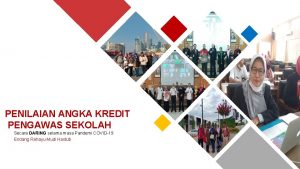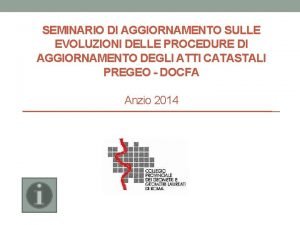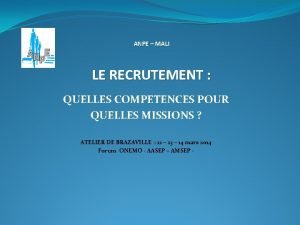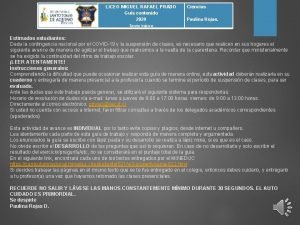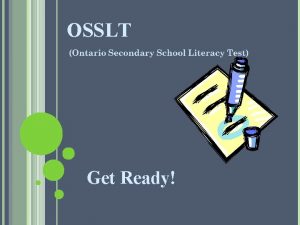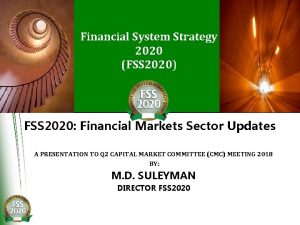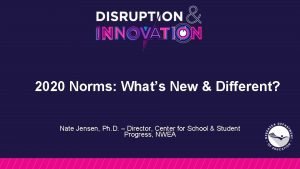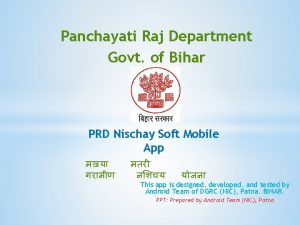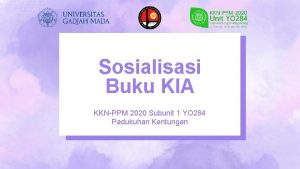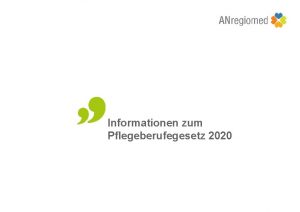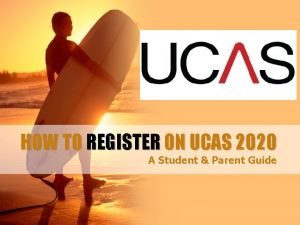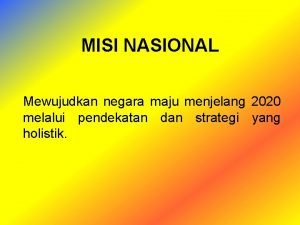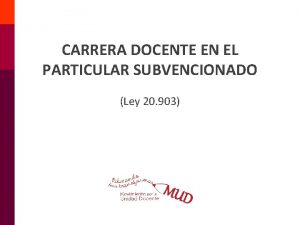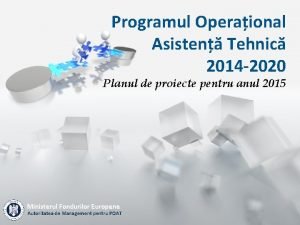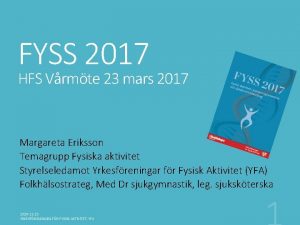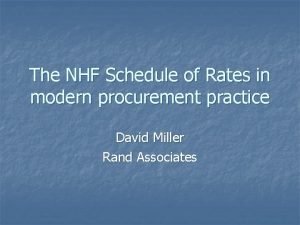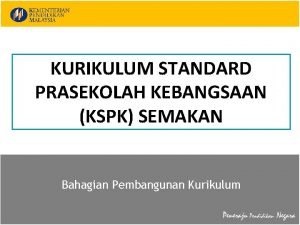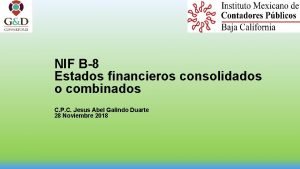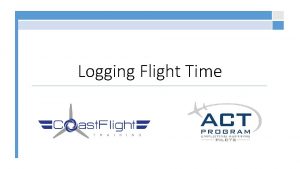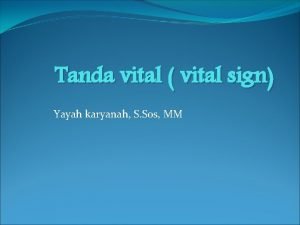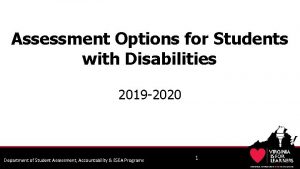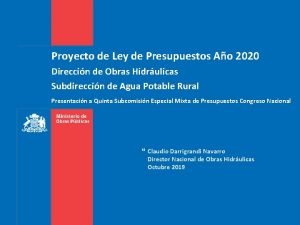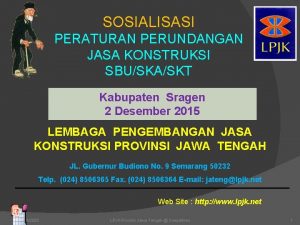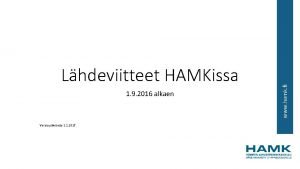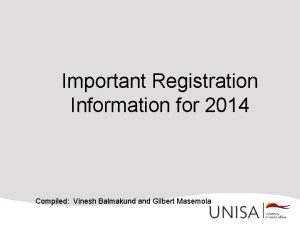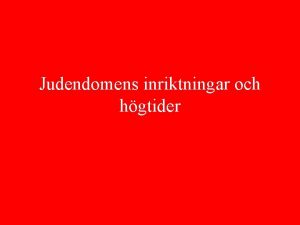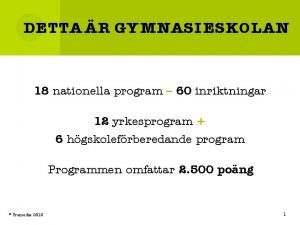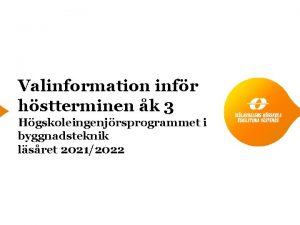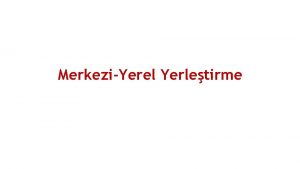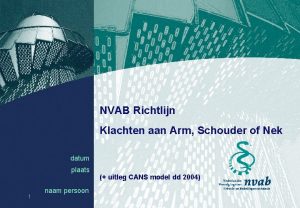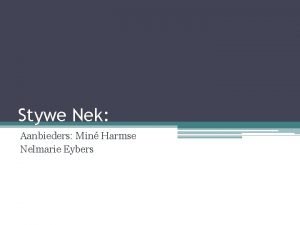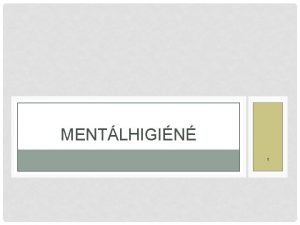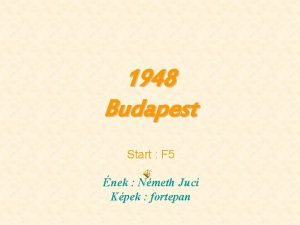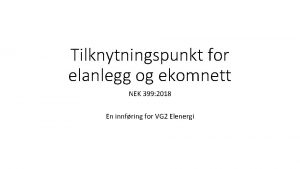Valinformation NEK 2020 03 10 2 Tv inriktningar






























































- Slides: 62

Valinformation NEK 2020 -03 -10

2 Två inriktningar • Ekonomisk analys eller finansiell ekonomi. • Ni väljer fritt ihop ett paket av kurser. • Valet görs i studentportalen mellan måndagen den 30: e mars och söndagen den 4: e april. • Båda kurserna i Ekonometri på avancerad nivå har en grundläggande kurs i Ekonometri (7, 5 HP) som förkunskapskrav. • Finansiell riskhantering (15 HP) har Finansiell ekonomi (7, 5 HP) och Kredit- och Valutamarknaden (7, 5 HP) eller motsvarande som förkunskapskrav.

Inriktningar årskurs 4 - Nationalekonomi • Du väljer två 7, 5 hp kurser från period 1 och två 7, 5 hp kurser från period 2. • Väljer du inriktningen Finansiell ekonomi läser du endast Finansiell riskhantering 15 hp under period 1 och rekommenderas att välja Ekonometri: Tidsseriedata och Makroekonomi under period 2. EKONOMISK ANALYS Hösttermin Period 1 Hösttermin Period 2 Vårtermin Behavioural 7, 5 HP Economics FINANSIELL EKONOMI Mikroekonomisk 7, 5 HPSpelteori analys teori Institutionell teori 7, 5 HP och analys Ekonometri: 7, 5 HP Panel- och tvärsnittsdata Ekonometri: 7, 5 HP Tidsseriedata Examensarbete inom Nationalekonomi 30 HP 7, 5 HP Finansiell 15 HP riskhantering Macroeconomic 7, 5 HP theory 3

Mikroekonomisk teori Ali Ahmed

Mål Efter avslutad kurs kommer du att kunna: • Redogöra för samt med hjälp av matematiska analysmetoder härleda samband inom centrala delar av den mikroekonomiska teorin. • Analysera mikroekonomiska problem med hjälp av dessa teorier. • Redogöra för och tillämpa de centrala principerna i mikroekonomiskteoretisk analys, d v s optimering, jämviktsanalys och komparativ statik.

Kursinnehåll • Konsumtionsteori. • Produktionsteori. • Förväntad nyttoteori. • Partiell jämviktsteori. • Allmän jämviktsteori. • Välfärdsteori.

Litteratur • Gravelle, H. , & Rees, R. (2004). Microeconomics. Harlow, Essex: Prentice Hall. • Problem och övningsuppgifter. • Gamla tentor. • Kompletterande stenciler.

Undervisnings- och arbetsformer. Examination.

Varför ska du läsa kursen? • Mikroekonomi handlar i grund och botten om att fatta goda beslut under begränsade omständigheter. D v s beslut som vi fattar varje dag. Mikroekonomisk teori ger en verktygslåda samt utvecklar den mentala förmågan att fatta så bra beslut som möjligt givet de förutsättningar som råder. • En utmaning under din utbildning där du utvecklar din mentala uthållighet. • Högt signalvärde på arbetsmarknaden och för vidare studier. • Underlättar dina studier på andra kurser.

Mikroekonomisk analys Ali Ahmed, Pernilla Ivehammar och Gustav Tinghög

Mål Efter avslutad kurs kommer du att kunna: • Sammanställa, kritiskt granska och värdera aktuell forskningslitteratur inom det mikroekonomiska området. • Tillämpa mikroekonomiska teorier inom valda områden. • Kunna läsa och tolka olika typer av vetenskaplig litteratur.

Kursinnehåll • Tillämpningar av mikroekonomisk teori kopplat till aktuell forskning. • Fördjupad insikt och forskningsanknytning till vissa forskningsområden. • De olika moment som ingår i kursen och de övningar som examinationen består av är till för att förbereda dig för uppgifter som är vanligt förekommande för en nationalekonom i arbetslivet och som är nödvändiga vid vetenskapligt skrivande. • Antalet föreläsningar har minimerats och det aktiva deltagande av studenterna har maximerats. • Ger kunskap om tre aktuella mikroekonomiska forskningsområden, vilka varierar från år till år.

Litteratur • Litteraturen består mestadels av vetenskapliga texter. Introducerar dig till tre typer av texter som kommer vara viktiga för ditt uppsatsskrivande och ditt framtida yrkesliv: 1. Working papers. 2. Vetenskapliga refereegranskade artiklar. 3. En ny publicerad bok.

Undervisnings- och arbetsformer. Examination.

Varför ska du läsa kursen? • Ger träning på tre viktiga vetenskapliga färdigheter, nämligen att kunna granska forskning, jämföra studier och konceptualisera idéer. • Viktig kurs inför uppsatsskrivandet. De flesta studenter är svaga när det gäller att konceptualicera sina idéer. • Viktig kurs för arbetslivet då ovanstående färdigheter krävs i kvalificerade yrken oberoende av vilket jobb det är. • En kurs som uppdateras varje år och där teman och frågor som ligger på forskningsfronten studeras. • Många utvecklar sin uppsatsidé under denna kurs.

Behavioural Economics Kinga Barrafrem (och några till…)

2020 -03 -10 Applied Behavioral Economics What is so special about behavioral economics? • It extends economic principles by allowing that our decisions are affected by social and psychological influences, as well as rational calculation of costs and benefits • It brings together insights from a wide range of disciplines, e. g. , economics, psychology, sociology, neuroscience. • This helps enrich our understanding of economic and financial behavior without abandoning the conventional economic models 17

2020 -03 -10 18

2020 -03 -10 Applied behavioral economics • Course objective: – Account for the problems associated with standard economic theory and explain how psychological factors influence decisions – Know what are and how to use research methods used in behavioral economics – Use empirics and theory to make conclusions about individual’s behavior – Design well-conceived experiments and surveys to answer relevant research questions – Critically evaluate existing policies aimed at improving decisions and suggest constructive ways of helping individuals make better decisions 19

2020 -03 -10 20 Applied behavioral economics • Teaching and examination: – Lectures and seminars (about equal split). Different lecturers with various research interest will discuss topics that they specialize in. – We will go through some theories during the lectures, but we will focus more on discussing behavior, experiments etc. – The idea is that this course will help you improve as scholars in general, look critically at other studies, think how to design own study, what is important in a study, etc. – Examination: term paper (written in pairs) + referee review + active participation in seminars (including ”seminar tickets”)

2020 -03 -10 Applied behavioral economics • Some topics that will be discussed: – Why and when do people take too little / too much risk? – Why do people procrastinate? – Why do people not take full advantage of the information available? – What are some of the most common biases people succumb to? – What are different types of behavioral interventions? How effective they are? – How to conduct experiments? –… 21

2020 -03 -10 Is it useful? Where? Master thesis Managerial decision making Policy making Consumer behavior Banking, finance, financial advise To help ourselves make better decisions 22

Spelteori Kinga Barrafrem

2020 -03 -10 Game theory (Spelteori) • Course objective: – Describe the key concepts and critically evaluate game theory and its methods – Critically evaluate and objectively refer to game-theoretical research – Apply game theory in the analysis of economic issues • Teaching: lectures, tutorials, seminars • Examination: writtent exam + active seminar participation 24

2020 -03 -10 25 Game theory (Spelteori) Still from ”A Beautiful Mind” (2001), a movie about John Nash, the father of game theory

2020 -03 -10 Game theory (Spelteori) • Game theory can be effectively used as a tool for decision-making in both personal and business setting • It can be applied in number of fields, e. g. , : – Business – Finance – Economics – Political science – Psychology – Marketing – Management 26

2020 -03 -10 Game theory (Spelteori) • Some topics that will be discussed: – Strategic behavior in one-shot decisions – Strategic behavior in repeated & dynamic interactions – Strategic behavior with incomplete information – Analysis of news (politics, business, everyday life) – Present myself vs. future myself – Problems with voting –… 27

Institutionell ekonomi Peter Andersson, Hans Sjögren, Bo Persson och Mariana Gustavsson

Institutionell teori och analys 1 • Vad behövs för att marknader ska fungera effektivt? (eller vad hindrar dem från att göra det? ) • Alltid fria nytto/vinstmaximerande beslut … • … eller styrs vi av beteendenormer, vanor, rutiner, regler, lagar…? • -> Institutioner = (ekonomiska) aktörers ”spelregler”: • Internationella konventioner, EU-direktiv, nationella lagar, förordningar, sektorsregler … avtal och kontrakt … = formella spelregler på olika nivåer • … med tillhörande kontroll och sanktioner • …men också informella normer för beteende. • Grundade i värderingar.

Institutionell teori och analys 2 • I kursen studeras betydelsen av institutioner för: - enskilda marknaders funktionssätt - ekonomisk tillväxt (sänka transaktionskostnader) och välfärd, politik… - hur institutioner uppkommer, lever kvar, förändras • Institutionerna: - möjliggör och begränsar - skapar förutsägbarhet - sänker transaktionskostnader • … men kan också begränsa och försena utveckling

Institutionell teori och analys 3 • Fyra delar * teoretiska grunder * institutionell förändring * kollektiva dilemman * reglerande institutioner • Ingen ”lärobok”: läs forskarnas originalartiklar och egna böcker • Löpande examination: litteraturseminarier med ”inträdesbiljett” 1 muntlig redovisning, 2 skriftliga större uppgifter • = mycket att läsa, öva på att skriva (vetenskapligt), formulera egna slutsatser, förhålla sig till traditionell nationalekonomi, förstå formella och informella spelreglers funktion på mikro och makroplanet; • Tillämpning: kunna utforma ”effektiva institutioner”

Ekonometri: Paneldata Jonathan Siverskog och David Andersson

33 Kursen • Fördjupning i OLS – Kausalitet, icke-experimentella data och omitted variable bias (OVB) – Heteroskedasticitet, autokorrealtion och robust inferens • Modeller när OLS är mindre lämpligt – binär data. ja/nej – ordinal data. enkätsvar: dåligt, OK, bra – positiva tal / heltal. kostnader / antal vårdtillfällen – Censurerade och trunkerade data. överlevnad, tid i arbetslöshet • Instrumentvariabler och paneldata – Naturliga experiment för att hantera OVB

34 Varför välja? • Bra val om man tänkt att skriva en kvantitativ uppsats • Svår kurs – men hög marginalnytta av kvantitativa färdigheter i de flesta arbeten

Ekonometri: Tidsseriedata Gazi Uddin (för Bo Sjö)

Course Description • The course deals with typical economic problems that involves time series data. • Time series is just data ordered by time. Macroeconomics and finance is filled by time series data that we need to understand. • Prices of all sorts of goods, inflation, exchange rates, asset prices, supply and demand. Etc. • To understand macro problems and finance, you need to understand the basic of time series econometrics. • You cannot read anything advanced unless you have an understanding about stochastic time series process. 36

Goal of the course • Time series econometrics is different from traditional statistics and basic econometric course. • Here you start by sampling from a population and then make an inference. • Economic time series are given processes that we need to understand we build models based of our dataset. • First, we describe their different components, and second, we try to understand them from economic theory. 37

Course learning outcomes • We go through necessary time series, mathematical statistics concepts. Quick repetition of OLS and other estimation methods. • We learn how to describe and forecast economic time series with ARIMA modelling. Remember you are surrounded by forecasts but can you trust them? • We look at non-stationary data and how to build models that builds on meaningful stable long run relations. • There around 12 exercises and 3 labs. All are selfinstructive. • You learn a lot of practical stuff in this course. 38

Macroeconomic Theory Gazi Uddin

FEBRUARY 27, 2021 Title/Lecturer: Macroeconomic Theory Course Outline & study plan • Course Title : Macroeconomic Theory • Course Code : 730 A 37 • Start Date : • Language : English • Contact : Gazi Salah Uddin • E-mail : gazi. salah. uddin@liu. se • Lecture : 10 • Seminar : 4/5 • Written Exam : 3 hp • Term Paper : 4. 5 hp • Term Paper : Presentation and Referee report mandatory • Referee report (one) : Mandatory (Pass or Fail) • Office : 319: 239 40

FEBRUARY 27, 2021 Title/Lecturer: Macroeconomic Theory Course description • The course covers the key macroeconomic concepts, theories, analytical approaches and empirical analysis. • The focus will be on the modern growth theory, theories of business cycles, monetary policies, consumption and investment theory and unemployment. • In addition, the course will discuss the recent literature and analytical methods used for examining contemporary macroeconomic issues such as, environment, migration, and economic crises. 41

Title/Lecturer: Macroeconomic Theory FEBRUARY 27, 2021 Goal of the course After completion of the course the student should be able to: • -understand the key areas of macroeconomic theory and its applications. • -implement appropriate macroeconomic models for analyzing economic problems. • -apply macroeconomic methods to critically evaluate current economic and financial conditions and policy implications. • -work with macroeconomic panel and time series data to estimate appropriate inference/parameters for analyzing recent macroeconomic issues. 42

FEBRUARY 27, 2021 Title/Lecturer: Macroeconomic Theory Course Outline & study plan (tentative) • Lecture on Economic Growth and application ( 3/4 lectures & Exam) • Lecture on Business Cycle & Monetary Policy (2 lecture & Exam) • Lecture on Migration & Remittances (1 lecture) • Lecture on Environment & Energy Economics (2 lectures) • Lecture on Macro-finance and Uncertainity (1/2 Lecture) • Exam date: As per University Schedule 43

FEBRUARY 27, 2021 Title/Lecturer: Macroeconomic Theory Seminar and Term paper Seminar-01 • Part A: Data Construction and sources • Part B: Referee Report: Economic Growth • Part C: Discussion based on the referee report and mandatory reading (marked in *) Seminar 02 • Part A: Referee Report: Environment and migration • Part B: Potential Research Proposal Submission and Discussion • Part C: Discussion based on the referee report, Proposal (TP) and mandatory reading (marked in *) Seminar 03 • Part A: Referee report: Business Cycle and Macro Finance • Part B: Potential Research Proposal Submission and discussion • Part C: Discussion based on the referee report, Proposal (TP) and mandatory reading (marked in *) Seminar 04/05 • Final Presentation of the Term paper: • Referee report as a opponent (Mandatory) 44

FEBRUARY 27, 2021 Title/Lecturer: Macroeconomic Theory References • David Romer, Advanced Macroeconomics, 3 rd ed. Or 4 th Mc. Graw-Hill. • Scientific Articles • Study Materials. • Grading: In order to get VG, you need to get VG both exam (3 hp) and term paper (4. 5 hp). • Seminar attendance is mandatory. • Final term paper presentation is mandatory • Referee report submission is mandatory • Opponents report submission is mandatory 45

Macroeconomic Theory Topics

Gross domestic product (GDP) at current prices in 2018 (in trillion U. S. dollars) Gross domestic product (GDP) of selected global regions 2018 60 51. 07 GDP in trillion U. S. dollars 50 40 33. 67 30 18. 75 20 13. 67 10 5. 25 3. 48 3. 15 1. 64 0 Advanced economies Emerging and developing countries Note: Worldwide Further information regarding this statistic can be found on page 8. Source(s): IMF; ID 256328 4 EU Euro area Latin America / Middle East, North Middle East and Africa sub-Sahara Caribbean Africa, North Africa Afghanistan, and Pakistan

FEBRUARY 27, 2021 Title/Lecturer: Macroeconomic Theory BREXIT 48

Business Cycle 49

Title/Lecturer FEBRUARY 27, 2021 50

FEBRUARY 27, 2021 Environment and Climate Change 51

FEBRUARY 27, 2021 Trade (US-China)War • . 52

Title/Lecturer: Macroeconomic Theory FEBRUARY 27, 2021 Coronavirus • The impact of Coronavirus on the financial markets and the Real Economy 53

Finansiell riskhantering Göran Hägg, Jonathan Siverskog, David Stenvall, Axel Hedström och Bo Sjö

Finansiell ekonomi Finansiell riskhantering! • En unik kurs i finansiell ekonomi – Finansiell teori – Marknadens bästa böcker – Finansiell information – Reuters – Datastream – Modellbygge • Börssalen/Nobelsalen – Finanslabb • En unik pedagogik – Egna portföljer • Arbeta som proffsen – Praktisk • Frihet under ansvar 2021 -02 -27 5 5

Titel/föreläsare Vad handlar kursen om. • Hur ta hand om andras pengar => Avkastning • Hur undvika att snabbt bli fattig => Riskhantering • Hur lösa kunders finansierings och investeringsproblem över livscykeln / över tiden? • Jobba hårt med verklighetsnära uppgifter / case. 2021 -02 -27 56

Finansiell ekonomi Mål med kurs o utbildning… • Ge en bra Teorigrund • Överbrygga gapet mellan Teori o Praktik • Göra er anställningsbara och attraktiva • Göra er kritiskt medvetna • Ge möjlighet till valfrihet och personlig anpassning av utbildning • Ge er ansvar och förtroende 2021 -02 -27 5 7

Finansiell ekonomi Kursen fokuserar på Investering • Aktier och aktiemarknaden • Optioner och optionsmarknaden • Verklighetsförankrade projektuppgifter • Riskhanteringsmetoder • Finansiell psykologi • Finansiell statistik • Excel och programmering i VBA • Case-lösning • Kundperspektiv 2021 -02 -27 5 8

Finansiell ekonomi Kursupplägg… • Introduktionsvecka – skapa portföljer • Åtta veckor av portföljförvaltning • Fyra veckor om derivatinstrument • Case o Dugga – Examination • Fyra veckor portföljvalsteori och finansiell statistik • Gästföreläsningar från näringslivet • Seminarier om beteendefinans mm • En veckas förberedelse till redovisning av portföljvalsprojekt – Examination 2021 -02 -27 5 9

Titel/föreläsare Varför läsa Finansiell riskhantering • Teoretisk grund att stå på! • Praktisk träning / Färdighetsträning! • Överbrygga gapet mellan teori och praktik! • Ge er en fördel när ni söker jobb! • Ge er en fördel när ni har jobb! 2021 -02 -27 60

Till sist. . .

Finansiell ekonomi 2021 -02 -27 Frågor… • Det finns mer information om kurser på kurshemsidan… Läs gärna igenom kursplaner… • Var inte rädd för att ställa frågor om kurser till oss lärare… • Beroende på intresse och vad ni vill göra i framtiden finns kombinationer av kurser som kanske passar bättre ihop… • Välj med hjärta och hjärna… 6 2
 Anatmavada in buddhism
Anatmavada in buddhism Vilka inriktningar finns inom buddhismen
Vilka inriktningar finns inom buddhismen Vilka inriktningar finns inom buddhismen
Vilka inriktningar finns inom buddhismen Pnömatozis intestinalis nek
Pnömatozis intestinalis nek Nek usklikne sad nebesko mnoštvo anđela
Nek usklikne sad nebesko mnoštvo anđela Izlij duha svoga tekst
Izlij duha svoga tekst Nek usklikne sad nebesko mnoštvo anđela
Nek usklikne sad nebesko mnoštvo anđela Nek slavljen bude bog
Nek slavljen bude bog Nek zel formula
Nek zel formula Litanie della misericordia
Litanie della misericordia Toyota mtrix
Toyota mtrix Kadar pengangguran graduan di malaysia 2020
Kadar pengangguran graduan di malaysia 2020 Jessie arbogast 2020
Jessie arbogast 2020 Initial and transmuted grade
Initial and transmuted grade Fam 2020 checklist
Fam 2020 checklist Revised programme of assessment 2020
Revised programme of assessment 2020 Tanzania national nutrition survey 2018
Tanzania national nutrition survey 2018 Mapas de progreso
Mapas de progreso Umpmts 2020
Umpmts 2020 Re gcse past papers
Re gcse past papers Plan nawozowy aplikacja
Plan nawozowy aplikacja Besaran dana bop paud 2020
Besaran dana bop paud 2020 Alzheimers nz conference 2020
Alzheimers nz conference 2020 Fit turbo kit
Fit turbo kit Formato de planificación educación parvularia
Formato de planificación educación parvularia Skala gred spm 2014
Skala gred spm 2014 Angka kredit pengawas sekolah
Angka kredit pengawas sekolah Erasmus 2014 2020
Erasmus 2014 2020 Instrumente structurale
Instrumente structurale Vademecum pregeo 2020
Vademecum pregeo 2020 Anpemali
Anpemali 100 preguntas para la ciudadana 2020 en ingls
100 preguntas para la ciudadana 2020 en ingls Chapter 37 discipline
Chapter 37 discipline Ejemplos de problemas estructurados y no estructurados
Ejemplos de problemas estructurados y no estructurados Osslt 2018 practice test
Osslt 2018 practice test Fss 2020
Fss 2020 2020 map norms
2020 map norms 7 nischay soft
7 nischay soft Sosialisasi buku kia 2020 ppt
Sosialisasi buku kia 2020 ppt Pflegeberufegesetz 2020
Pflegeberufegesetz 2020 Fhs harmonogram
Fhs harmonogram Register with ucas
Register with ucas Teras utama misi nasional
Teras utama misi nasional Pago bienios profesores particular subvencionado
Pago bienios profesores particular subvencionado Predicadores cristianos 2020
Predicadores cristianos 2020 Global carbon budget 2020
Global carbon budget 2020 Telpas writing samples 2020
Telpas writing samples 2020 Poat 2020
Poat 2020 Géraldine chaplin 2020
Géraldine chaplin 2020 Katie dallam art
Katie dallam art Fyss 2017
Fyss 2017 Nhf schedule of rates book
Nhf schedule of rates book Kspk
Kspk Definición de control según la nif b-8
Definición de control según la nif b-8 Colorado academic standards 2020
Colorado academic standards 2020 Logging dual flight time
Logging dual flight time Letak nadi
Letak nadi Vaap manual
Vaap manual Ao 2020
Ao 2020 Doradcy wrocław rekrutacja 2020
Doradcy wrocław rekrutacja 2020 Ska ahli teknik bangunan gedung
Ska ahli teknik bangunan gedung Lähdeluettelomerkintä
Lähdeluettelomerkintä Gilbert masemola
Gilbert masemola










